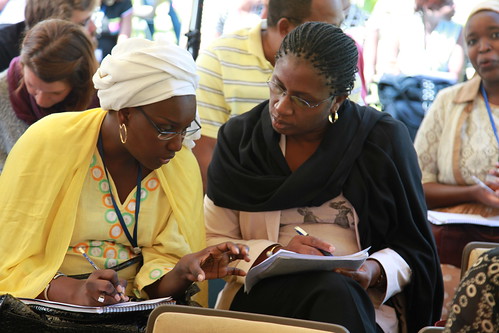Two participants share experiences in the 'AgKnowledge Africa' Share Fair that is taking place this week at the Addis Ababa campus of the International Livestock Research Institute (photo credit: ILRI/Habtamu)
Over 300 agricultural experts, including researchers, farmers, extension workers, scientists, rural development agents and government representatives from across Africa and other parts of the world are meeting this week in Addis Ababa, Ethiopia, to exchange ideas about how Africa’s local knowledge and information can be tapped and applied to drive Africa’s agricultural development.
Meeting at an ‘AgKnowledge Africa’ Share Fair, which began on 18 October 2010 at the Addis Ababa campus of the International Livestock Research Institute (ILRI), these experts are sharing their experiences in using local African knowledge and related approaches and tools to raise the profile and productivity of African agriculture.
‘Africa and its people have a lot of undocumented knowledge, information and data that could be used to help drive the continent’s development,’ said Nadia Manning-Thomas, a knowledge sharing specialist. Manning-Thomas works with a program of the Consultative Group on International Agricultural Research called ‘Information and Communication Technologies—Knowledge Management. This project (known by a mouthful of an acronym: the CGIAR ICT-KM) and ILRI are two of the organizers of this week’s Addis Share Fair.
‘Our aim in this Fair,’ says Manning-Thomas, ‘is to help Africa’s innovators find and use ways they can apply African knowledge—whether from local communities or regional organizations or research institutions—to drive agricultural growth’.
This week’s Fair (18–21 October 2010) is making use of traditional African ways of sharing knowledge, from traditional story-telling, to Ethiopian coffee ceremonies, to Kenyan barazas (Swahili for gatherings held to raise awareness and to share collective wisdom) to marketplace discussions. The first of its kind in Africa, this event has attracted participants from Europe and Asia as well as the continent.
‘This is an opportunity for ILRI and other researchers to join the conversation taking place among development experts in Africa,’ said Peter Ballantyne, head of ILRI’s knowledge management and information services and a main organizer of the Fair. ‘It’s also an opportunity for all the participants to create new partnerships and to get new ideas. We’re giving people a variety of “spaces” in which to talk that are great opportunities for us at ILRI to “listen” to ideas and innovations in local knowledge, especially among partners driving agricultural development in Africa.’
The Fair’s participants are also reviewing how mobile phones, internet-based tools and other new ways of sharing information are being used to spread knowledge across the continent. A ‘social reporting team’ evolving at ILRI is broadcasting the Share Fair’s proceedings using a variety of tools and platforms, including a daily news sheet, video, radio (podcasting) and blogging.
The Fair started on 18 October 2010 with a ‘learning and training day’ before the official opening on 19 October, made by Bruce Scott, head of ILRI’s partnerships and communications programs, representing ILRI’s director general, Carlos Seré. The topics being debated by the 300 participants include agriculture, water, climate change, land and livestock.
More than 10 organizations—including the International Fund for Agricultural Development, the Food and Agriculture Organization of the United Nations, the Technical Centre for Agricultural and Rural Cooperation, and the Pastoralist Forum Ethiopia—have erected exhibits illustrating particular ways of sharing knowledge.
Among the Fair’s more exciting exhibits is one about Shujaaz FM, a cutting edge comic set in Kenya targeting the half of Kenyans under the age of 18. Although this new multimedia initiative leads with a comic book, it also is pulling together all the existing communications technologies, including a daily radio show, a website, and downloadable comics for mobile phones (sms), computer television, newspapers, etc. The aim of the comic is both to entertain the young and to help them put money into their pockets, and thus help them build livelihoods. Among the first stories in the series is a cracking tale on how to dye baby chickens pink (and why) and another on how to grow kale (the popular Kenyan dish made with sukuma wiki) in sacks in slums.
Want to know more?
Listen to an IRIN radio podcast for more about Shujaaz FM.
Read an earlier story on the AgKnowledge Africa Share Fair on the ILRI News blog.
And follow the Share Fair proceedings daily via our:
Blogs: http://tinyurl.com/sfaddisblog
Photos: http://tinyurl.com/sfaddisphotos
Tweets: http://tinyurl.com/sfaddistweets



